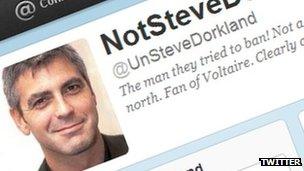Are spoof Twitter accounts at risk?
- Published
- comments

The account holder said he does not work for Northcliffe media
Twitter - a place where you can start a spoof account and have a bit of fun while being sure your anonymity will be preserved, right? Wrong. The case of @unstevedorkland shows that nobody can be that confident that they can mock a powerful organisation and get away with it.
The Twitter account in question is a somewhat crude - to some eyes offensive - exercise designed to mock Steve Auckland, the Chief Executive of Northcliffe Media, a regional newspaper business owned by the Daily Mail group.
Last week the blogger Guido Fawkes revealed that Northcliffe had taken legal action, external to try to force Twitter to unmask whoever was behind the account - and yesterday he followed up with news that the user had been warned his or her details would be handed over, external on 1 August.
Guido's verdict was that the individual in question was being "hung out to dry by a billion dollar US company." And indeed it seemed that Twitter had caved in under pressure from the Northcliffe assault.
But a closer look shows that Twitter has done what it does with all court orders - complied with the law while alerting those affected. Just as it did when the US authorities sought details of people connected with Wikileaks, or a British local authority tried to unmask an allegedly libellous account, the social network has informed "@unstevedorkland, external" about the progress of the legal action.
In all such cases, Twitter believes it has to comply with a ruling from courts in its Californian home, but give those targeted the information they need to get a lawyer and defend themselves.
What's more, the person behind the @unstevedorkland account contacted my colleague Dave Lee to reveal that Twitter had suggested that the civil liberties group the Electronic Freedom Frontier might help in the case.
Still, this is really sobering for anyone who thinks their anonymity is safe on the servers of a giant corporation based in a land where free speech is supposedly guaranteed by the First Amendment. The American courts, it seems, are fairly welcoming to those seeking to unmask people they accuse of doing them harm.
Two other spoof Twitter accounts come to mind. @Queen_UK, external purports to be our monarch, and portrays Her Majesty quite affectionately as a gin-swilling granny with a mischievous take on the world. Typical tweet - "One would report that one is enjoying an olympic sized gin, but one doesn't have the necessary sponsorship rights, external."
Then there is our own dear The Killing Station (@killingstation, external), an account set up in tribute to Television Centre's very fine BBC staff catering facility, the Filling Station. It mocks both the food on offer and prominent BBC correspondents. Here's a typical offering: "What's so bleedin' special about our Special Correspondents? Apart from the fact that they never say please or thank you. Never. Ever. Rude, external."
All good fun - but what if Buckingham Palace or the BBC decided that they were not amused, that these spoof accounts were in fact offensive and constituted harassment of staff? Then both organisations could go to court in California and have a good chance of forcing Twitter to unmask the people behind @Queen_UK or @killingstation.
Which brings us back to Northcliffe Media. A spokeswoman for the company told me that the legal action was not a sense of humour failure but an attempt to protect staff from a stream of offensive remarks which constituted the kind of harassment no employer would tolerate.
If the tweets were really that offensive, I am not clear why Northcliffe did not take the matter to the police in the UK, who have investigated similar matters, rather than resort to the American courts. And if the account was really masquerading as someone else, then the company could have asked Twitter to take it down.
If Northcliffe Media hoped to make the problem go away, then the strategy has failed. Before the legal action @unstevedorkland had just 150 followers. Now 850 people are reading the account's tweets and the case is attracting global attention. The Daily Mail group, which owns Northcliffe, has a very clever online operation which is winning big audiences around the world for a diet of celebrity news and gossip - but this is one story which it did not want to take off.